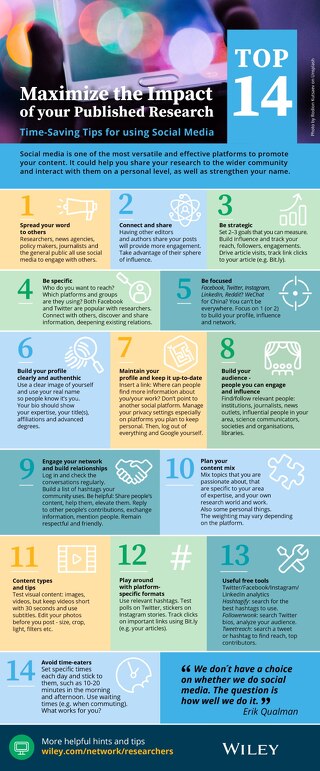how-to-promote-your-work-using-off-page-seo-search-engine-optimization
June 05, 2014
An earlier post on this topic ‘Search Engine Optimization and your journal article: do you want the bad news first?’ focused on tips to make your journal article optimized for search engines. Generally relevant for promoting both journal articles and books, today’s post looks beyond the journal article structure to ‘off-page’ SEO strategies.
SEO, SEO, SEO.It seems like all we hear these days is about the importance of Search Engine Optimization. But there is a good reason for that. Don’t believe me? Google it! When talking about Google search alone, the numbers are both impressive and scary at the same time:
- Daily, Google crawls 20 billion sites and processes 100 billion searches
- Yearly, there are 525 algorithm changes (computer programs and formulas that transform search queries into meaningful results), each algorithm containing more than 200 variables
So what does that all mean? Google is fast, efficient, imperative, and complex as heck.
Unfortunately it is nearly impossible for those of us who don’t live, breathe, and sleep SEO to keep up with its ever-changing landscape. However, there are some fundamental things we can do to yield return results in line with what people are actually searching for (hint: this is the core of what Google is trying to accomplish with their constant algorithm changes).
Take heart; I’m not talking about 301 redirects, site architecture, or unethical black hat SEO; below are a few fundamental tips we can all utilize. You need to create valuable additional content (outside of your published works) and get people to link to you – your name, your brand,and your work (note this does not address Google Scholar, which is a topic unto itself!):
√ Content, content, content
Developing content sounds pretty easy, particularly in the academic and scientific communities where producing content is our bread and butter. However, there are additional ways you can get your name (and by extension your published content) out there in the online universe:
- Write a blog. Search Engines love blogs.With the rise of social media platforms like Facebook and Twitter many people question whether blogs still have their place and the answer is a definitive YES! Sometimes people want a greater level of engagement on a certain topic and blogs are a great way to accomplish this while also positioning yourself as a thought leader in your space.
- Get on Google+. It probably doesn’t come as a great shock that using Google’s social media platform will also help in other areas of Google’s offerings. In this case it means that your individual posts can show up in Google as a search result and are very important in increasing your SEO rankings.The best way to make Google+ work for you is to find relevant communities and contribute to those conversations. And best of all, if you are looking for content to post you can repurpose your blog content on your Google+ page.It’s two for the price of one!
√ Link Building
Google weighs a link to your website just as a researcher would value a citation or a book-buyer might consider a positive review. The more inbound links you have, the more Google will value and highlight your content.
- Integrate .edu’s. Links from .edu’s are like gold.Google loves links from institutional websites, yet it amazes me how infrequently you see this taken advantage of.If you write or publish content make sure that you link to it from your profile page on your institution’s website.It is also critical to reach out to other members of your community to get them to link to your content as well. A word of caution, Google doesn’t like reciprocal links (for the most part) so be careful of a, “you link to mine and I’ll link to yours” approach.
- Wikipedia. Whether we like it or not, one of the first places many people look for substantive information is Wikipedia.Try finding a Wikipedia page on a topic related to your article and add content and your article link as a reference.












